Running Agile Without a Product Owner: How to Not Derail Your Sprint
- Admin
- Apr 18, 2025
- 3 min read
Updated: Apr 19, 2025

One of the quiet but real dysfunctions in Agile teams today is this:
There’s no product owner.
Sometimes, not even a product manager.
And what happens?
Developers get “requirements” from someone in business ops who just wants something done. Jira tickets are vague. Details arrive mid-sprint. Daily standups turn into “wait, what exactly do you want here?”
If you’re managing a team in this situation, here’s how to survive—and eventually stabilize.
Quick Refresher: Product Manager vs. Product Owner
Product Manager
Focuses on the market, revenue, and business strategy
Thinks about what to build and why it matters
Talks to leadership, customers, and business stakeholders
Tries to improve revenue, reduce cost, and grow operations
Has a long-term vision for the product or platform
Product Owner
Focuses on the team and sprint delivery
Helps define how to build features in the short term
Works closely with developers and testers
Owns the backlog, writes user stories, and helps clarify requirements
Acts as a bridge between the product manager and engineering team
So What Do You Do When They’re Both Missing?
You’re often left dealing directly with business users—someone in ops, support, or sales. They want results, but don’t always give clarity.
Here’s how to lead from the middle:
1. Start with a Firm Sprint Schedule
Let’s assume your sprint starts every Wednesday.
You need to build a cadence like this:
Previous Thursday or Friday: Sprint Grooming Call with Business
Monday–Tuesday: Clarification window — business answers follow-ups
Tuesday: Sprint Planning with dev team (especially offshore)
Wednesday: Sprint officially starts—with clarity and confidence
2. Host a Grooming Call with the Business
Even if they don’t act like a product owner, treat them as one—but set expectations:
They must create Jira tickets ahead of the sprint
In grooming, go through their proposed stories
Ask: “What is the top priority?”, “What’s the problem we’re solving?”, “What happens without this?”
Let your questions come up—and give them until Tuesday to clarify
This structure helps business learn over time what a “good story” looks like.
3. Prepare the Developers Ahead of Sprint Start
If you’re working with distributed teams (e.g., India + US):
Don’t let sprint start = first time they’re seeing the tickets
Host a planning call Monday/Tuesday
Walk through what came out of grooming
Share business context, story priorities
Let devs ask questions before they start
Encourage devs to create their own subtasks if needed (since no product owner is doing it)
This gives them ownership and a head start.
4. Enforce a Healthy Tech Debt Ratio
Business will never ask you to do refactoring. So you must own it.
Set a fixed 80/20 or 70/30 rule:
80% sprint capacity = business value stories
20% = tech debt, refactoring, internal efficiency
Explain to business:
“We take on 20% tech debt work so the 80% can go faster next sprint.”
Make it a non-negotiable practice.
5. Expect That It Will Take Weeks to Normalize
Don’t expect immediate adherence.
Business will sometimes forget to create tickets
Developers will ask late questions
Priorities may shift
But if you hold to the structure and rhythm, things start to improve.
In Summary
Running Agile without a product owner is tough.
But with these practices, it’s not just survivable—it’s productive:
Weekly grooming with business (Thursday or Friday)
Developer prep before sprint start (Monday or Tuesday)
Balanced sprint capacity (80/20 rule)
Encourage developers to think like product owners
Normalize over 2–3 sprint cycles
Eventually, even without official roles, the rituals will enforce the right behaviors.


Comments